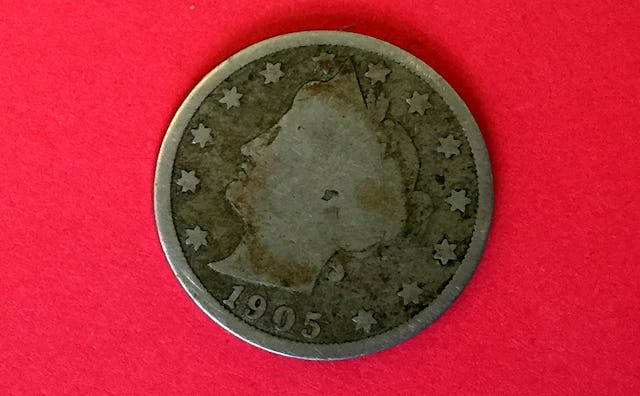The Nickel That Traveled Through Time

“The written word may be man’s greatest invention. It allows us to converse with the dead, the absent and the unborn.” —Abraham Lincoln
It’s a little thing, a nickel. This one in my hand is from 1905 and bears a prominent V on the back—a Victory nickel. It’s smaller and lighter than a contemporary five-cent piece, and its surfaces are smooth, just as you’d expect something that has been passed from hand to till to hand for more than a century to be. Although, maybe that hasn’t happened to this particular coin. This one has been out of commission for decades, resting until recently in a small white jar with a black top, inside a metal box in the home of Ms. Jane Pearson Waits near Oxford, Mississippi.
But this nickel has come a long way and carries with it the spirit of the Abraham Lincoln quote, above, which also happens to be the driving force of Cafe.
A few weeks ago, I wrote about my Chinese-American grandma, who spent 65 years living in a small town in the Mississippi Delta. I didn’t write the piece expecting many people to read it, which was good, because not many did. In the story, I talked about my mother’s older brother, Tommie, who drowned when he was 12—a loss that has affected our family for generations.
Most of the people who read the article were from the Mississippi Delta—many Chinese-American, many not. They were old classmates and neighbors and friends of my mom and her siblings. Some were total strangers. One was Jane Waits, who found my mom online and sent her an email explaining that she and my uncle Charles Edward graduated together in the class of 1958. She also wrote this:
“My brother, Michael Pearson, forwarded the article by your daughter. When she talked about the Chinese custom of giving the nickel at the cemetery, it brought back memories. My deceased brother, William (Buddy) Pearson attended the funeral of Tommy [sic] and brought home a nickel. My mother, Louise Pearson, had that nickel and as I discussed this with Mike we remembered that it was in a small white jar. Mike remembered that it was a “Victory nickel” and the jar had a black top.
“When my mother came to live with me at the age of 87 (and died at 90) she brought some of her furniture and a number of personal items. One of those was a metal box with her important papers and some coins. After my memory had been prompted, I got the box and opened it. I did find the jar (which has a Pepsodent face cream label); but the jar had not one but 4 Victory nickels. My initial thought when I remembered the coin was that I would send it to your daughter. If she would like to have one of the four, I will still be happy to do so.”
Just a few days later, on Christmas, my mom handed me an envelope containing a holiday card—Santa bearing a giant stack of presents on the front—with a handwritten note from Ms. Waits. “I am so happy to share this with Jennifer,” she wrote in her lovely cursive. A small packet slipped out into my palm: the nickel, tucked neatly into a folded and taped scrap of paper.
I held the nickel in my hand and wondered if it was the one my grieving family had placed in a small white envelope 66 years ago, as they sat around a table, in shock, preparing for a boy’s funeral. There’s no way to know if it’s the very coin Ms. Waits’s brother took home from the cemetery—the cemetery I visited just months ago, spending a few moments at Tommie’s grave. It doesn’t matter. What matters is that our lives span forwards and backwards, that someone might not be able to forget us. Tommie, or his death, or his life, meant something to another boy that day—enough for Michael to pocket this memento and carry it with him throughout his life. Enough for his own mother to keep it after her son was gone. Enough for her daughter to remember it and send it back, full circle, to my mother, and to me.
This article was originally published on